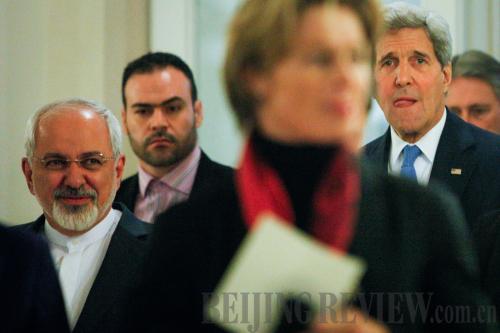|
 |
|
THINKING DIFFERENTLY: Iranian Foreign Minister Mohammad Javad Zarif and U.S. Secretary of State John Kerry attend a closed-door meeting of nuclear talks at Palais Coburg in Vienna, Austria, on November 24 (ZHANG FAN) |

The parties involved in the Iranian nuclear talks announced a second extension of negotiations as they failed to reach a comprehensive agreement by the scheduled deadline of November 24. The agreement states that the interim Geneva deal—officially titled the Joint Plan of Action, which was sealed between Iran and the P5+1 countries on November 24, 2013—will also be extended to June 30, 2015. The P5+1 group involved with the Iranian nuclear negotiations comprises the five permanent members of the UN Security Council—the United States, Russia, China, Britain and France, plus Germany.
After its second extension following the previous one in July, the interim Geneva deal, which consists of a short-term freeze of portions of Iran's nuclear program in exchange for decreased economic sanctions on the country, has become a de facto "permanent" deal. The seemingly prosaic result is in fact a clear reflection of the conundrum of the Iranian nuclear issue and strained relations between Washington and Teheran.
Security vs. sanctions
Ten rounds of official negotiations between Iran and the P5+1 group have already been held this year, in addition to numerous meetings among experts as well as bilateral and trilateral foreign ministers' meetings. These combined efforts have yet to produce a breakthrough, suggesting that a final deal may be highly unlikely for the foreseeable future. One of the key sticking points between Iran and the United States, the two major negotiating parties, has to do with uranium enrichment.
The goal of the United States is to prevent Iran from obtaining nuclear weapons. However, Washington has acknowledged that Teheran already possesses the technical know-how to produce nuclear weapons, thus its specific objective is to ensure that the latter cannot produce enough highly enriched uranium to make a nuclear bomb within half a year.
Given that Iran has diluted its 20-percent enriched uranium stockpile in accordance with the Geneva deal, the United States is focused on reducing Iran's current 19,000 centrifuges to a few thousand. Meanwhile, Iran wishes to safeguard its right to pursue uranium enrichment capability as a nuclear deterrence. After the conversion of its 20 percent-refined uranium, centrifuges have become Iran's biggest trump card for its uranium enrichment capability. Iran's supreme leader, Ayatollah Ali Khamenei, said in July that the country needs 190,000 separative work units to fuel a planned network of nuclear power plants, arguing that all existing 19,000 centrifuges should be kept. The gap between Iran and the United States is thus very wide.
Both the United States and Iran take the sanctions seriously. The United States believes that tough energy and financial sanctions have forced Iran to compromise and return to the negotiating table. Thus, whether as a weight in the nuclear talks or to contain Teheran for the long term, the United States may choose to continue the sanctioning indefinitely. In fact, the United States has constantly stressed to the international community the importance of nuclear-related sanctions and even expanded the list of sanctions once again earlier this year.
On the part of Iranian authorities, the most important thing is to prevent external sanctions from severely damaging the country's economy and thus threatening their rule. Otherwise, all their gains on the nuclear issue will be in vain. In the aftermath of the Geneva deal going into effect, Iran is now faced with fewer sanctions than ever before. For instance, $700 million in Iranian assets are being released on average monthly, and the interim agreement has also lifted sanctions on Iran's petrochemical and automobile industries. These relaxations are of little help for the nation's economic recovery, however. Thus, Iran has strongly argued for a lift of sanctions on key economic sectors including oil exports, fund transfers and energy investment.
Although Washington and Teheran seem unable to reach an agreement for the time being, the talks are not expected to break down. Under the Geneva deal, Iran has frozen portions of its nuclear program in an effort to alleviate the international community's concern over the newest chapter of a potential nuclear crisis. As U.S. Secretary of State John Kerry said, Iran's current nuclear capability is much less pronounced than one year ago.
|
